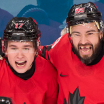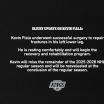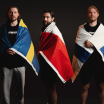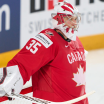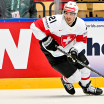Danielle Dube knew exactly what she wanted to be when she grew up. Richard Brodeur.
Growing up in Vancouver, and playing in goal, she idolized the Canucks netminder, who wore No. 35 and played 377 games for the club in the 1980s.
"My dream was always to wear a Canucks jersey with 35 but Dube on the back," she recalled.
From an early age, Dube was drawn to hockey. Her father, who worked as a firefighter, picked up the game later in life and when she wasn't in school, he would take her to the rink with him. Dube can remember watching him from the stands until one day she told him that she wanted to be on the ice, too.
Once she was enrolled in hockey, Dube tried her hand at forward and defence, and took turn in net. While she wasn't initially drawn to the crease, she embraced the opportunity to become a fulltime goaltender when the novice travelling team needed a permanent netminder.
At that time, there was no organized hockey for girls in east Vancouver, so when Dube started playing in the Grandview minor program, she was the only girl among the ranks.
How Danielle Dube Became UBC's Goaltender at 40 Years Old
After playing in the ECHL, Dube completed her degree and led the UBC women's hockey team to the playoffs
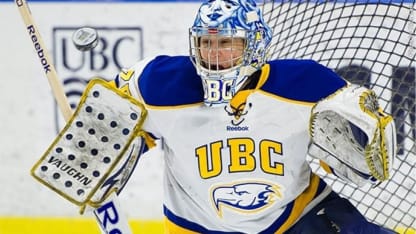
© Luis Sinco/Getty Images
"I was used to being the only girl," she said. "For everyone else it was a big deal, but I grew up playing with these same kids and I was always just their goalie."
After graduating from Grandview, Dube went on to play in the British Columbia Junior Hockey League before moving on to short stints with minor professional teams, where she saw limited action.
During the summers, back in Vancouver, Dube started skating with the Canucks. It didn't take Dube long to recognize that that being on the ice with NHL talent, even in the offseason, presented her with an opportunity. She started videotaping herself competing against NHL players and mailing the clips off in the hope they would catch the eye of a pro team.
"I sent it to hundreds of teams all over the states to look for tryouts," she said. "When you call as a girl you kind of get laughed at, so I sent footage so they could actually see me playing."
Eventually she got a call from one of the owners of the Long Beach Ice Dogs of the West Coast Hockey League. After reviewing her film, he told her that he wanted to give her a try out.
"He said if you go there and prove yourself you'll have a place to play and it won't be about being a girl," he said. "If you can play, you'll make the team."
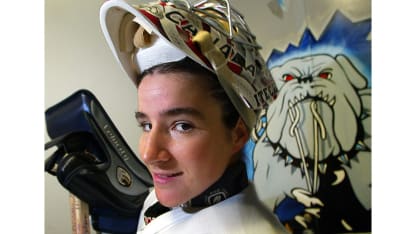
© Luis Sinco/Getty Images
Dube made an impression on the club during her tryout and stuck around, but after a couple of weeks she was sent home. Ice Dogs head coach Kevin Kaminski, a former hardnosed NHLer, told her that she was good enough to play in the league but just didn't have a place for her.
Unable to find a spot for her on the roster, Kaminski assured her he would do his part to find her someone else to play.
Assuming her time with the Ice Dogs was over, Dube returned to her apartment, packed up her car, and started driving home to Vancouver. She figured that, while Kaminski got things lined up, she might as well return to Canada and wait for her next try out.
But before Dube had even made it out of California, Kaminski called her on her cell phone. She pulled over on the side of the road to take the call. The coach asked if she could come to his office.
Dube explained that would be a little difficult because she was currently in Redding, more than 500 miles to the north. Kaminski still encouraged her to come back because he had had a change of heart.
"He said that after going home to his three daughters he changed his mind," Dube said. "He kind of admitted that he sent me home because he didn't know how to deal with a girl on the team, but he thought about his own girls and wondered how he would feel if they had this dream and someone said no to them because they were a girl."
So Dube turned her car around and headed back to Long Beach. Although she was now a member of the Ice Dogs, Dube didn't see much action early into the season. She played eight minutes in the club's home opener, but that was about it.
Finally, after a series of injuries and call ups, Dube got her opportunity. On December 11th, 2002, she got the nod, becoming just the third woman to start in a men's professional hockey game.
Although Dube was making history, she didn't see it like that at the time.
"It was just another hockey game," she said. "I wanted to show well and do well so I could get more opportunities."
After making 18 saves in a 4-1 loss, Dube went on to play 16 games with the Ice Dogs that season and picked up two victories.
Following her campaign with Long Beach, Dube was given a try out the next year with the Texas Wildcatters of the ECHL. While at camp in Idaho, Dube learned pretty quickly that if things worked out, she would be the team's third-string goaltender.
"I had bounced around in minor pro leagues as a third goalie for quite a few years before Long Beach, so I was kind of getting to the point where I've got to shit or get off the pot," she said. "I can't do this forever."
Rather than sojourning through the minor pro hockey ranks, Dube hung up her pads and trained to become a firefighter. After starting her new career, she had two children and before she knew it, she had been out of hockey for almost a decade.
Watch: Youtube Video
She made her way back to the ice when the Canadian women's national team invited her to be a goalie coach. After doing a few camps with them, she started coaching at the University of British Columbia (UBC).
While working with the women's Thunderbirds at UBC, Dube was lured out of retirement. The fulltime firefighter and mother enrolled in the Psychology program and quickly rediscovered her passion for hockey.
"It's funny when I started coaching, I thought I missed being around hockey but it wasn't that, I missed actually playing," she said. "As soon as I started playing I was like this is what I missed."
Although she hadn't really played at a competitive level for nearly ten years, Dube relied on her extensive experience. "Even though I was older and maybe not as quick as I was in my 20s, I still had the knowledge of the game and was able to read the game and see it," she said.
Playing women's hockey for the first time outside of her national stints, she almost had to learn a new game.
"When I played in the men's game, I was pure stand-up because I had to cover as much net as I possibly could," she explained. "But in the women's game, it doesn't really suit a stand-up goalie all that much because it's a little 'scramblier' without the hitting. It's a completely different game but because of those 10 years off, the goalie coach was able to teach an old dog new tricks."
Dube quickly shook off any rust she may have had and adapted to the new game. That season, the her team punched their ticket to the national championship, becoming the first UBC hockey team to accomplish the feat.
While Dube initially thought she might only play one year, and cross varsity hockey off her bucket list, the excitement of the season encouraged her to stick around. During the 2016 season, just a few weeks away from her 40th birthday, Dube led the T-Birds into the playoffs once again. Not long after that she completed her degree.
Tweet from @hometownhockey_: ICYMI: Former @TeamCanada goalie, Danielle Dube joined @RonMacLeanHTH & @TaraSlone on the desk today to chat about her experience playing for @UBCWHKY and gives kudos to her Dad for starting her bold hockey career. pic.twitter.com/C3IS4Bn9Cm
Dube didn't become Richard Brodeur when she grew up, but she did make her hockey dreams come true. Two years ago she started skating with the Canucks alumni. While in Kitimat, British Columbia, getting ready to play in her first charity game, she walked into the dressing room and couldn't believe her eyes. Waiting for her was a No. 35 Vancouver Canucks jersey with Dube on the back.
Although it wasn't exactly how she imagined it when she was a kid, it was the perfect way to bookend her hockey career.
"Even though someone might tell you it's a crazy dream, it doesn't have to be the perfect thing at the end," she said. "To me it just came true in a roundabout way."






